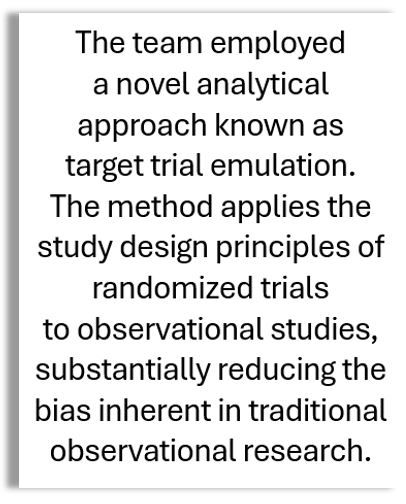- Clinical Technology
- Adult Immunization
- Hepatology
- Pediatric Immunization
- Screening
- Psychiatry
- Allergy
- Women's Health
- Cardiology
- Pediatrics
- Dermatology
- Endocrinology
- Pain Management
- Gastroenterology
- Infectious Disease
- Obesity Medicine
- Rheumatology
- Nephrology
- Neurology
- Pulmonology
In the Old and Very Old, Statins Appear Safe for Primary CVD Prevention, New Analysis Finds
Continuous statin use among adults aged 75 years and older resulted in a mean relative risk reduction in CVD of 28% without heightened safety concerns, a new study found.
Courtesy of HKUMed

Continuous statin therapy was associated with a significant 21% reduction in relative risk of cardiovascular disease (CVD) over 5 years among adults aged 75 to 84 years, according to findings from a team of researchers from Hong Kong and the US. The relative reduction in risk was even more pronounced in study participants aged 85 years and older, at 35%, over the follow-up period. The beneficial effects of the class of HMG-CoA reductase inhibitors in the old and the very old populations were observed without increased risks of severe adverse events, researchers noted.1
The study, a collaboration between teams from the LKS Faculty of Medicine of the University of Hong Kong (HKUMed) and the Harvard TH Chan School of Public Health, was published in the Annals of Internal Medicine.1
“These findings have significant implications for informing clinical decisions regarding the initiation of statin therapy for this increasingly large population group,” Cindy Lam Lo-kuen, MBBS, MD, Danny DB Ho Professor in Family Medicine at HKUMed, said in a press release.2 “This study also pioneered a new research method to explore many more important but unanswered clinical questions related to the care of the elderly in real-world practice.”2
Despite the widespread use and long-documented efficacy of statin medication to reduce the risk of CVD and all cause mortality, consensus on their use for primary prevention in adults aged 75 years and older remains limited, investigators wrote. In part the confusion is a result of exclusion of the older age group from landmark statin trials.1 US guidelines do recommend ongoing use of statins for ASCVD risk reduction in the older population for secondary prevention but for primary CVD prevention the recommendations “are less direct and weigh heavily on the patient-physician discussion as well as overall concerns for polypharmacy, frailty, and life-expectancy.”3

To more closely evaluate the long-term benefit-risk profile of statin drugs used for primary CVD prevention in the elderly, Lo-kuen and colleagues tapped real-world data from territory-wide public electronic health records in Hong Kong collected between January 2008 and December 2018, according to the study. Study eligibility required age of 75 years or older, suboptimal lipid levels and risk factors for CVD, including diabetes.1
A total of 69 981 individuals aged 75 to 84 years and 14 555 aged 85 years and older were considered eligible for analysis. Among 42 680 matched person-trials aged 75 to 84 years, and 5390 matched person-trials aged 85 years and older, 9676 and 1600 participants developed CVD in each age group, respectively (mean follow-up, 5.3 years).1
FINDINGS
The investigators reported that use of statin therapy was associated with significant reductions in the primary CVD composite endpoint of 6% in the 75- to 84-year-old group and of 15% in the 85 years and older group. The incidence of CVD events over 5 years in statin users was 1.2% (95% CI, 0.57% to 1.82%) lower in the 75- to 84-year-old cohort and 4.4% (95% CI, 1.40% to 7.48%) lower in the older cohort compared with participants not taking statins.
In the per protocol analysis, the relative reductions in CVD events were 21% and 23% in the old and very old groups, respectively. CVD incidence was lower by 5% in statin users aged 75- to 84-years-old and by 12.5% in those aged 85 years and older.
The absence of an observed increase in risk of adverse events in the study, eg myopathies and liver dysfunction, suggests that advanced age needn’t be a discriminatory factor for initiating statins in older adults, the authors wrote. “Considering the increasing burden related to CVD in the aging population, our study results support the prescription of statin therapy for primary prevention of CVD in old and very old adults,” they continued.1
“The innovative approach adopted in this study has the potential to generate high-quality evidence in the field of geriatric medicine, thereby advancing our understanding and improving healthcare outcomes for older populations,” the team concluded.1
